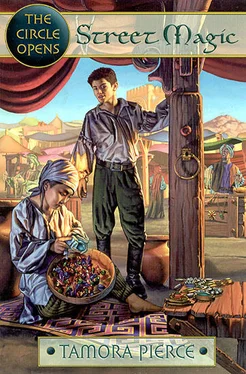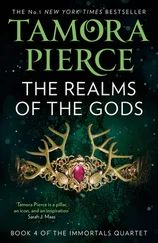He nudged his horse forward; the Watchmen ahead wheeled their mounts and led the way. Briar glanced back to see if the rest followed: he might still escape if they didn’t. No, they were moving forward, all but one. That one was bent in the saddle, listening intently to two people. One was a woman dressed like a local servant, the other a man whose sand-colored clothes made him look like part of the walls or of the dirt underfoot. The woman finished first. Hoisting a large jar on her hip, she trotted up the road and out of sight around the bend. The man faded into the blind alley, and the Watchman they’d spoken to caught up with the rest.
Who are they watching on this street? Briar wondered as he faced front again. He knew the look of police informers and official stakeouts. The mutabir was looking at someone on Attaneh Road, looking hard.
The ride to the mutabir’s residence, at the base of Justice Rock, was a short one. Briar used the time to let the plants that grew along the way know he’d been there, in case Rosethorn had to come after him. There was nothing to distract him from talking to them—the Watchmen were as closemouthed as stones.
Ordinary folk got out of their way quickly. Briar wasn’t sure if that meant the Watch were respected and appreciated, or simply feared. Either way boded ill for a former street thief. He checked his hands often to reassure himself that his arrest tattoos had indeed been consumed by the green vines under his skin. As if they sensed his unease, the vines on his left hand sprouted gaudy blue and yellow blooms. The ones on the right sported tiny black roses.
Servants at the mutabir’s residence took Briar’s horse and donkey, while his escort led him on foot through an outer courtyard. On either side stood the Watch commanderie and Justice Hall, crouched like guardian dogs, the shuttered windows staring blindly at one another. Both were massive structures of some kind of granite, rare stone for that part of the country. Briar shivered as he walked between them.
Passing through a gate on the far side of the courtyard, the Watchmen led him through a beautifully arranged desert garden. Briar felt a softening in his attitude—it was hard to dislike people who enjoyed gardens like the Chammurans did—and hardened his heart. Gardens or no, he didn’t like the way things were done here. Duke Vedris’s fair, if heavy, hand in such matters back in Emelan had soured Briar on Sotat law and courts.
From the garden he was shown into a sprawling house. Immediately to their right as they entered was a large and airy chamber, walled and floored in cool white marble, with green and red stone vine inlays along the ceiling and floors. The shutters were open, but the insides of the windows were covered with carved wooden screens to keep people from seeing into the house. Pillows were scattered on the floor, for supplicants, Briar supposed. At the far end of the room, bracketed by Watchmen who carried long spears, was a marble dais covered with long, flat cushions; other small, plump cushions were heaped on it.
A man sat there, sipping from a tiny coffee cup. As he did so, he turned papers over with his free hand. Papers and coffee pot were placed on two short wooden tables.
A second person—was it a man? — sat on the edge of the dais, legs crossed under him. He wore the head-to-toe veil of a Mohunite; only dark eyes showed through the slit left for them. Unlike the blue one Mai had worn to hide from the Gate Lords, this veil was dark gray. The wearer would be a Mohunite initiate—a mage.
A third person, a veiled scribe, sat at a full-sized table in the shadows at the rear of the dais. Briar could only see hands and painted eyelids: the scribe was a woman. She wrote busily, her work illuminated by a brass lamp.
The sight of her made Briar feel slightly more comfortable. He wondered if he would ever get used to the way that women east of the Pebbled Sea were expected to keep to homes and families. Few were encouraged to work in the larger world as the women he knew did. The mutabir must be all right, if he hired a woman for a sensitive job like this.
The head of the Watch detachment came to attention and said, “This youth, who our contact says is a pahan named Briar Moss, an eknub from Summersea, came to the house of Lady Zenadia doa Attaneh this morning, Lord Mutabir, as did the pahan Jebilu Stoneslicer. This youth was inside the house for a period of two hours, in the matter of a miniature tree. When he left the house, we followed our orders and conveyed him to you. Pahan Jebilu remains at the house.”
“Very well, Hedax Yoson.” The coffee-drinker’s voice was deep and melodic, a huge voice for a slender man. “You and your squad are dismissed.” The mutabir dressed simply for a Chammuran of power in loose breeches of dark green linen, a white shirt, black sash, and a long-sleeved, dark green overrobe. He had no jewelry or embroidery; no braids hung below his crisp, white turban. He watched the Watchmen file from the room and nodded to Briar. “You may approach.”
Right then Briar knew he’d been with Rosethorn, Sandry, and Tris for much too long. Their part of him demanded that he stay where he was, prop his fists on his hips, and demand to know what was going on before he went any further. They did that a lot, no matter how much trouble it caused. Against them Briar put his street rat self. He had survived ten years by smiling, bowing, agreeing, mouthing “your highnesses” to anyone and everyone, and running the moment a chance was offered.
The street rat won, in a way. “May it please your highness, I’d like to know what the charge is.” He smiled, trying for charm.
“Have you done anything worthy of a charge?” the mutabir inquired. He sat up, putting down both coffee cup and papers. Whites and blacks had crossed on his family map often, Briar decided. His face was very light brown and splattered with freckles. It was impossible to see his hair, covered as it was by his turban, but his moustache was dark brown and full.
“Never did anything lawless, never will, highness,” Briar answered.
The gray-veiled mage raised a small crystal orb in fingers painted with henna designs. Red light danced in the orb’s depths. “He lies, my lord.” The voice was female.
The mutabir raised his eyebrows. “Interesting,” he mused. “Would you like to answer the question a second time, young pahan? ”
Briar glared at the mage. “I haven’t done anything recently,” he amended. The red lights in the crystal winked out. “I’m all respectable now.” Something shimmered in the depths of the stone and was gone. “Is there a truth spell on that thing?” he asked the mage. “How’d you put it on? Most truthsayers just look to tell if they’re lied to or not.”
The mage looked at the man on the dais, who nodded. She replied, “I purchased this device ready-made, from Jebilu Stoneslicer. The spells must be renewed every three years, but the procedure is simple enough.”
“Huh!” exclaimed Briar. “So the old pickle had some juice in him, once.”
“Why did you go to Lady Zenadia’s house?” asked the mutabir .
Briar looked at him. “I sold her a miniature larch—it’s a kind of pine, good for protecting against fire. I had to install it in a new dish and in the right place in her house.”
The mutabir searched through papers until he held one up. “According to our observers, you met the lady in the Golden House souk yesterday.”
“That’s when she bought the tree,” Briar explained.
“Did you see anything unusual in her house?” the mutibir wanted to know. “Hear anything, smell anything?”
Читать дальше












